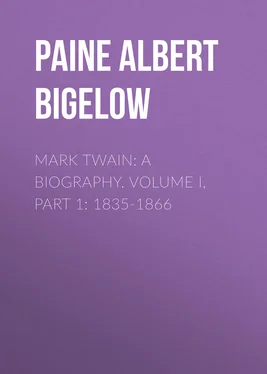Albert Paine - Mark Twain - A Biography. Volume I, Part 1 - 1835-1866
Здесь есть возможность читать онлайн «Albert Paine - Mark Twain - A Biography. Volume I, Part 1 - 1835-1866» — ознакомительный отрывок электронной книги совершенно бесплатно, а после прочтения отрывка купить полную версию. В некоторых случаях можно слушать аудио, скачать через торрент в формате fb2 и присутствует краткое содержание. Жанр: Биографии и Мемуары, foreign_antique, на английском языке. Описание произведения, (предисловие) а так же отзывы посетителей доступны на портале библиотеки ЛибКат.
- Название:Mark Twain: A Biography. Volume I, Part 1: 1835-1866
- Автор:
- Жанр:
- Год:неизвестен
- ISBN:нет данных
- Рейтинг книги:4 / 5. Голосов: 1
-
Избранное:Добавить в избранное
- Отзывы:
-
Ваша оценка:
- 80
- 1
- 2
- 3
- 4
- 5
Mark Twain: A Biography. Volume I, Part 1: 1835-1866: краткое содержание, описание и аннотация
Предлагаем к чтению аннотацию, описание, краткое содержание или предисловие (зависит от того, что написал сам автор книги «Mark Twain: A Biography. Volume I, Part 1: 1835-1866»). Если вы не нашли необходимую информацию о книге — напишите в комментариях, мы постараемся отыскать её.
Mark Twain: A Biography. Volume I, Part 1: 1835-1866 — читать онлайн ознакомительный отрывок
Ниже представлен текст книги, разбитый по страницам. Система сохранения места последней прочитанной страницы, позволяет с удобством читать онлайн бесплатно книгу «Mark Twain: A Biography. Volume I, Part 1: 1835-1866», без необходимости каждый раз заново искать на чём Вы остановились. Поставьте закладку, и сможете в любой момент перейти на страницу, на которой закончили чтение.
Интервал:
Закладка:
–[As mentioned in the Prefatory Note, Mark Twain's memory played him many tricks in later life. Incidents were filtered through his vivid imagination until many of them bore little relation to the actual occurrence. Some of these lapses were only amusing, but occasionally they worked an unintentional injustice. It is the author's purpose in every instance, so far as is possible, to keep the record straight.]
VII
THE LITTLE TOWN OF HANNIBAL
Hannibal in 1839 was already a corporate community and had an atmosphere of its own. It was a town with a distinct Southern flavor, though rather more astir than the true Southern community of that period; more Western in that it planned, though without excitement, certain new enterprises and made a show, at least, of manufacturing. It was somnolent (a slave town could not be less than that), but it was not wholly asleep—that is to say, dead—and it was tranquilly content. Mark Twain remembered it as "the white town drowsing in the sunshine of a summer morning, . . . the great Mississippi, the magnificent Mississippi, rolling its mile-wide tide along; . . . the dense forest away on the other side."
The little city was proud of its scenery, and justly so: circled with bluffs, with Holliday's Hill on the north, Lover's Leap on the south, the shining river in the foreground, there was little to be desired in the way of setting.
The river, of course, was the great highway. Rafts drifted by; steamboats passed up and down and gave communication to the outside world; St. Louis, the metropolis, was only one hundred miles away. Hannibal was inclined to rank itself as of next importance, and took on airs accordingly. It had society, too—all kinds—from the negroes and the town drunkards ("General" Gaines and Jimmy Finn; later, Old Ben Blankenship) up through several nondescript grades of mechanics and tradesmen to the professional men of the community, who wore tall hats, ruffled shirt-fronts, and swallow-tail coats, usually of some positive color-blue, snuff-brown, and green. These and their families constituted the true aristocracy of the Southern town. Most of them had pleasant homes—brick or large frame mansions, with colonnaded entrances, after the manner of all Southern architecture of that period, which had an undoubted Greek root, because of certain drawing-books, it is said, accessible to the builders of those days. Most of them, also, had means —slaves and land which yielded an income in addition to their professional earnings. They lived in such style as was considered fitting to their rank, and had such comforts as were then obtainable.
It was to this grade of society that judge Clemens and his family belonged, but his means no longer enabled him to provide either the comforts or the ostentation of his class. He settled his family and belongings in a portion of a house on Hill Street—the Pavey Hotel; his merchandise he established modestly on Main Street, with Orion, in a new suit of clothes, as clerk. Possibly the clothes gave Orion a renewed ambition for mercantile life, but this waned. Business did not begin actively, and he was presently dreaming and reading away the time. A little later he became a printer's apprentice, in the office of the Hannibal Journal, at his father's suggestion.
Orion Clemens perhaps deserves a special word here. He was to be much associated with his more famous brother for many years, and his personality as boy and man is worth at least a casual consideration. He was fifteen now, and had developed characteristics which in a greater or less degree were to go with him through life. Of a kindly, loving disposition, like all of the Clemens children, quick of temper, but always contrite, or forgiving, he was never without the fond regard of those who knew him best. His weaknesses were manifold, but, on the whole, of a negative kind. Honorable and truthful, he had no tendency to bad habits or unworthy pursuits; indeed, he had no positive traits of any sort. That was his chief misfortune. Full of whims and fancies, unstable, indeterminate, he was swayed by every passing emotion and influence. Daily he laid out a new course of study and achievement, only to fling it aside because of some chance remark or printed paragraph or bit of advice that ran contrary to his purpose. Such a life is bound to be a succession of extremes—alternate periods of supreme exaltation and despair. In his autobiographical chapters, already mentioned, Orion sets down every impulse and emotion and failure with that faithful humility which won him always the respect, if not always the approval, of men.
Printing was a step downward, for it was a trade, and Orion felt it keenly. A gentleman's son and a prospective heir of the Tennessee land, he was entitled to a profession. To him it was punishment, and the disgrace weighed upon him. Then he remembered that Benjamin Franklin had been a printer and had eaten only an apple and a bunch of grapes for his dinner. Orion decided to emulate Franklin, and for a time he took only a biscuit and a glass of water at a meal, foreseeing the day when he should electrify the world with his eloquence. He was surprised to find how clear his mind was on this low diet and how rapidly he learned his trade.
Of the other children Pamela, now twelve, and Benjamin, seven, were put to school. They were pretty, attractive children, and Henry, the baby, was a sturdy toddler, the pride of the household. Little Sam was the least promising of the flock. He remained delicate, and developed little beyond a tendency to pranks. He was a queer, fanciful, uncommunicative child that detested indoors and would run away if not watched—always in the direction of the river. He walked in his sleep, too, and often the rest of the household got up in the middle of the night to find him fretting with cold in some dark corner. The doctor was summoned for him oftener than was good for the family purse—or for him, perhaps, if we may credit the story of heavy dosings of those stern allopathic days.
Yet he would appear not to have been satisfied with his heritage of ailments, and was ambitious for more. An epidemic of measles—the black, deadly kind—was ravaging Hannibal, and he yearned for the complaint. He yearned so much that when he heard of a playmate, one of the Bowen boys, who had it, he ran away and, slipping into the house, crept into bed with the infection. The success of this venture was complete. Some days later, the Clemens family gathered tearfully around Little Sam's bed to see him die. According to his own after-confession, this gratified him, and he was willing to die for the glory of that touching scene. However, he disappointed them, and was presently up and about in search of fresh laurels.—[In later life Mr. Clemens did not recollect the precise period of this illness. With habitual indifference he assigned it to various years, as his mood or the exigencies of his theme required. Without doubt the "measles" incident occurred when he was very young.]—He must have been a wearing child, and we may believe that Jane Clemens, with her varied cares and labors, did not always find him a comfort.
"You gave me more uneasiness than any child I had," she said to him once, in her old age.
"I suppose you were afraid I wouldn't live," he suggested, in his tranquil fashion.
She looked at him with that keen humor that had not dulled in eighty years. "No; afraid you would," she said. But that was only her joke, for she was the most tenderhearted creature in the world, and, like mothers in general, had a weakness for the child that demanded most of her mother's care.
It was mainly on his account that she spent her summers on John Quarles's farm near Florida, and it was during the first summer that an incident already mentioned occurred. It was decided that the whole family should go for a brief visit, and one Saturday morning in June Mrs. Clemens, with the three elder children and the baby, accompanied by Jennie, the slave-girl, set out in a light wagon for the day's drive, leaving Judge Clemens to bring Little Sam on horseback Sunday morning. The hour was early when Judge Clemens got up to saddle his horse, and Little Sam was still asleep. The horse being ready, Clemens, his mind far away, mounted and rode off without once remembering the little boy, and in the course of the afternoon arrived at his brother-in-law's farm. Then he was confronted by Jane Clemens, who demanded Little Sam.
Читать дальшеИнтервал:
Закладка:
Похожие книги на «Mark Twain: A Biography. Volume I, Part 1: 1835-1866»
Представляем Вашему вниманию похожие книги на «Mark Twain: A Biography. Volume I, Part 1: 1835-1866» списком для выбора. Мы отобрали схожую по названию и смыслу литературу в надежде предоставить читателям больше вариантов отыскать новые, интересные, ещё непрочитанные произведения.
Обсуждение, отзывы о книге «Mark Twain: A Biography. Volume I, Part 1: 1835-1866» и просто собственные мнения читателей. Оставьте ваши комментарии, напишите, что Вы думаете о произведении, его смысле или главных героях. Укажите что конкретно понравилось, а что нет, и почему Вы так считаете.












